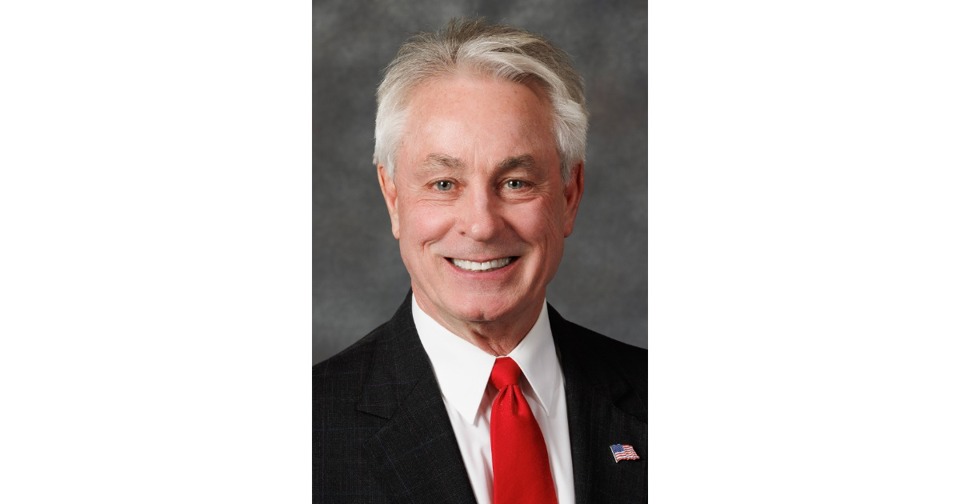Legislative Preview: Loren Lippincott

District 34 State Senator Loren Lippincott begins his third year in the Nebraska Legislature. Listen to an interview with Steve Stein in advance of the session on Wednesday.
Lippincott's priority bill is returning Nebraska to a 'winner take all' system for presidential elections. He's put together a fact sheet in advance of the session.
Winner Take All Briefing Guide
General knowledge: The Electoral College has 538 votes, 270 is 50% + 1, and is needed to win the presidency. Each state has two electoral votes for their two US Senators and one vote each for their US Representative. WY has the smallest population and has three electoral votes; CA is the largest with 55 votes.*
Current Status: Maine adopted the “District Plan” in 1972 to give third-party candidates a voice (US Rep. John Schmitz-R). Still in play with their four electoral votes.
In Nebraska, the “District Plan” was proposed in 1990 and again in 1991 and failed both times. It then passed in 1992 (by a simple majority of 25 votes). In 1995 and 1997 the legislature reversed course and returned to Winner Take All, but both times was vetoed by Democrat Governor Ben Nelson.
Attempts to return NE to Winner Take All have been attempted in 2000, 2001, 2003, 2006, 2014, and 2015.
Arguments are listed below:
NE adopted the District Plan because they thought it was a trend, an experiment! It did not catch on! The Experiment is over! This is a policy decision, not an experiment. No other states have joined the District Plan. If it was such a good idea CA, MA, NY, IL, CO would join. They don’t because much of their state is red! This puts NE out of step in the Electoral College Process.
Argument - The District Plan gives you a voice for your vote (a feeling). Is this only if the election goes your way? How do you measure a feeling?
Vince Powers (former NE Democrat Party Chair) said, “Votes count as long as your vote is cast.”
Argument - The District Plan increases grassroots participation and voter turnout. No! The candidate and their policies drive support and turnout.
Argument - The District Plan will encourage presidential candidates to visit NE. NE has only five electoral votes. Any candidate would visit OMA across from IA, with a large population center. The District Plan discourages candidates from addressing issues that appeal to the ENTIRE state by rewarding candidates to visit congressional districts with higher population and income levels, to the exclusion of rural NE.
Argument - The District Plan encourages third-party candidates to capture their share of electoral votes, increasing the likelihood that NO ONE candidate receives the needed 270 (majority of 538) electoral votes. This would mean the US House of Representatives would decide the Presidency.
If the entire nation joined ME and NE with the District Plan, in 2012 Mitt Romney would have become president with 277 votes vs. Obama’s 260 votes. District Plan CAN favor either party. Uniformity is the argument. In the presidential elections of 2008 and 2020, votes were split in both ME and NE using the District Plan.
Winner Take All - Our state Governor, Secretary of State, Auditor, Treasurer, Attorney General and both US Senators serve the whole state and are elected by the whole state. The US President serves the whole state and should be elected that way. Every Other State is winner-take-all all except Maine. Why should we have to split our votes while California and the others do not? We should all be the same District or winner-take-all and right now we are an outlier.
Winner Take All - If the District Plan existed throughout the USA it would guarantee massive gerrymandering (manipulating the boundaries of an electoral constituency so as to favor one party).
Winner Take All - The Electoral College keeps small states, like NE, relevant; election results accepted; easier for candidates to campaign.
Consider: 6 cities population = 14 states combined population:
San Francisco, Los Angeles, Chicago, New York City, Boston, Philadelphia = AK, AR, DE, HI, ID, ME, MT, ND, NE, NH, NV, SD, VT, WY
Consider: New York City’s 8.2 million population is more than that in 39 individual states.
The Electoral College prevents tyranny of the majority, mobocracy. This same principle applies to the Winner Take All argument in voting for President. Winner Take All spreads out representation and prevents pockets of power in population centers, and ensures less populated areas are heard.
Regarding the Electoral College, people in WY have 4 times more say, per capita, than CA. (CA 39 million population = 54 votes and WY 576k population = 3 votes). CA 1 electoral vote per 709k population // WY 1 vote per 192k population. 4:1 ratio. This gives the smaller states better representation since more populous states have more US Reps. It spreads out representation and prevents pockets of power in population centers.
—————————————————————————————————
Separate Voting issue challenging status quo of the Electoral College:
National Popular Vote (NPV) Interstate Compact would circumvent the Constitution in eliminating the Electoral College. It is gaining steam.
What it is: A State must award electoral votes to whoever wins the popular vote NATIONALLY. Regardless of who wins that state! Tribalism and mob rule would result. This would completely undo the representation spread across the nation and replace it with rules coming from a few population centers.
Presently 18 states (all democrat run) + DC have signed onto NPV. 270 electoral votes are needed to become effective. Presently 209 votes (39%) have signed this “Compact”. ALL democrat blue states.
National Popular Vote would trigger chaotic and contested results. The President may win with only 25% of the vote (with multiple candidates). The President would not have a mandate! This would result in political instability. Other countries have this and it has horrific results.
Our current status quo of the electoral college reduces fraud and isolates a state from a “group think” voter outcome. Our current system balances competing interests of large states and that of small states. Better ideas and legislation results.
Rural America's crime rates are less than half those of Urban America. Urban centers tend to vote Democrat. Population centers need to be balanced with rural representation!
Loren Lippincott 1/2/25
